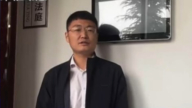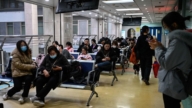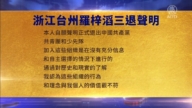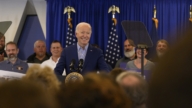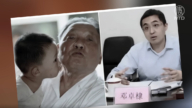【新唐人2012年4月20日訊】因為重慶市前公安局長王立軍出逃美國駐華領事館,美國因此被捲入一場敏感和充滿爭議的中國內政風波。雖然美國白宮一直對王立軍出逃事件保持難得的沉默。但現在,美國官員開始透過美國媒體,披露了王立軍2月6號闖入美國駐成都總領事館後,滯留36小時的細節,包括華府和美國駐成都領事館,甚至北京方面的反應。其中暗藏甚麼玄機?請看專家解讀。
近來重慶市前市委書記薄熙來事件,佔據了中國各地報紙,和國際幾大媒體的重要版面,而薄熙來事件,是由重慶市前公安局長王立軍闖入美國成都總領館開啟的。
《紐約時報》4月17號引述美國官員的話報導說,王立軍是在「激動不安的狀態下」(agitated state)出現在美國駐成都總領事館。王立軍說話的內容並不是完全有條理,但是還是提供了一些內幕(insight)。他擔心自己生命受到威脅,而提出政治庇護申請。
報導指出,王立軍講述了一個充滿腐敗與謀殺的故事,主要是指控薄熙來和他妻子谷開來的詳細材料。他還提供了一些涉及中共高層權鬥的爆炸性信息,但是,報導說,王立軍沒有把這些材料交給美國官員。
時事評論員夏小強:「王立軍之所以跑到美領館,為了保命,他肯定是帶著資料的,並且他既然申請政治庇護,他手裡沒有東西他憑甚麼呢?憑嘴裡說,是不可能的,美方在這個時候一定會留下…起碼說,複印他那些資料,並且,很可能是全程錄音的,這是涉及到中國,中共內部,可以說是國家機密的一個重大消息和事件,美國一定會重視的。」
夏小強認為,《紐約時報》在玩一種文字遊戲,主要是想告訴外界,美方並沒有掌握王立軍提供的文字或資料。
《紐約時報》在爆料中說,美國官員透露,王立軍一開始是語無倫次(rambling),但最後還是讓美方了解到了涉及中共權力、政治和腐敗的錯綜複雜。
報導還提及,北京當局事後將王立軍扣押,調查他涉嫌將中國內部事務向美國洩露的行為。如果王立軍被起訴並被判以叛國罪,可能會被判處死刑。
時事評論員夏小強:「習近平去美國訪問的時候,美國已經放出來這個消息了,說周永康要政變,他現在說,王立軍沒有把這些文字給他們,既然沒有給他們的話,又沒有錄音,又沒有文字,憑甚麼你在說他放這個料,對不對。所以不存在王立軍被判死刑這個問題,但是它起到的一個效果就是…轉移法輪功在中共內鬥中所起的作用。」
據了解,王立軍和薄熙來涉及大量活體摘取法輪功學員器官販售。
美國《華爾街日報》中文版網站4月19號也報導說,美國國會內部曾對美國國務院有關拒絕王立軍政治庇護的決定批評說,美國本來可以向王立軍提供「政治避難」,因為王立軍可以成為一件寶貴的「情報資產」,包括:他有可能向美國提供有關英商海伍德死因的信息,並幫助美國了解中國共產黨的內部運作機制。
《紐約時報》的這篇報導,據說,是根據沒有透露姓名的美國行政官員和國會助手,以及外交官提供的訊息撰寫的。而夏小強懷疑,《紐約時報》可能收到了中共江系所放出的假消息,也可能是他們內部進行了交易。
採訪/常春 編輯/周平 後製/鍾元
======================
New York Times reported details of Wang Lijun’s 36-hour stay in the U.S. consulate
The defect to the U.S. consulate by the head of Chongqing
Public Security Bureau, Wang Lijun, has involved the U.S.
in China’s political turmoil, which is a very sensitive
and controversial topic.
Although the White House has been unusually silent
on the event,
U.S. officials finally began revealing pieces of the inside story
via media, including what took place during
Wang’s 36-hour visit to the U.S. consulate in Chengdu,
as well as the reactions of Washington and Beijing.
What’s the message behind such a change?
Let’s hear from the political commentators.
Recently, the former Chongqing CCP secretary, Bo Xilai,
has frequently appeared in headlines of major newspapers
both in China and globally.
Bo Xilai’s event was triggered by Wang Lijun’s defect
to the U.S. consulate in Chengdu.
On April 17th, the New York Times cited U.S. officials who said
that Wang Lijun was in an agitated state when he arrived at the U.S. consulate.
The report stated that Wang’s speech was not quite coherant,
but still provided some important insights.
He was very worried about the safety of his life and applied
for political asylum with the U.S. government.
The report further revealed that, Wang Lijun told a story full
of corruption and murder,
and documents contained detailed evidence of
Bo Xilai and his wife Gu Kailai’s crimes.
He also leaked pieces of sensational information regarding
the top-level power struggle inside the CCP.
However, the report stated that Wang didn’t turn
those materials over to U.S. officials.
Political commentator Xia Xiaoqiang says: ”The reason
Wang Lijun fled to the U.S. consulate was to protect his life.
The evidence must have been with him, otherwise he would
have had nothing to exchange for political asylum.
It was impossible for him to make only oral statements.
At the very least, the consulate must have copied
the materials Wang brought with him.
It’s also highly possible that his conversations were
recorded in full.
It’s such an important event involving top insider secrets
the CCP, there’s no way the U.S. government didn’t pay serious attention to his words.”
Xia Xiaoqiang believed that the New York Times report
played a game with words by telling the world that
the U.S. government doesn’t have Wang Lijun’s materials
at hand.
In the same report, U.S. officials said that Wang Lijun
was rambling when he first arrived, but he later managed
to help the consulate officials understand the complexity
of the CCP’s politics involving corruption and power struggle.
The report also mentioned that the CCP authority arrested
Wang in order to investigate
how much of the CCP’s internal affairs he discussed
with the U.S. government.
he might be sentenced to death if convicted of treason.
Political commentator Xia Xiaoqiang: ”When Xi Jinping visited
the United States, the U.S. released a message saying Zhou Yongkang was planning a coup.
Now their report states that Wang Lijun didn’t provide them
with any materials.
If the U.S. doesn’t have any written or audio records, how
were they able to release the aforementioned message?
So in my opinion there’s no way Wang Lijun will be executed.
But this report can possibly change the fate of Falun Gong
persecution in the CCP’s power struggle,
which is what they are most afraid will be revealed
with detailed evidence.”
Wang Lijun and Bo Xilai were both believed to be involved
in massive live organ harvest of Falun Gong practitioners and organ sales.
On April 19th, the Wall Street Journal’s Chinese website
reported that
there were critics of the decision to deny Wang Lijun’s
political asylum inside the U.S. Congress.
The critics said that the U.S. should have accepted Wang
because he could become a precious intelligence source,
such as providing the cause of Heywood’s death or helping
the U.S. understand the CCP’s internal operations better.
It is said that the information in the New York Times report
was provided by anonymous U.S. officials, Congress assistants and diplomats.
Xia Xiaoqiang suspects that either the New York Times
received a fake inside message from Jiang Zemin’s faction,
or that internal transactions are behind the report.


